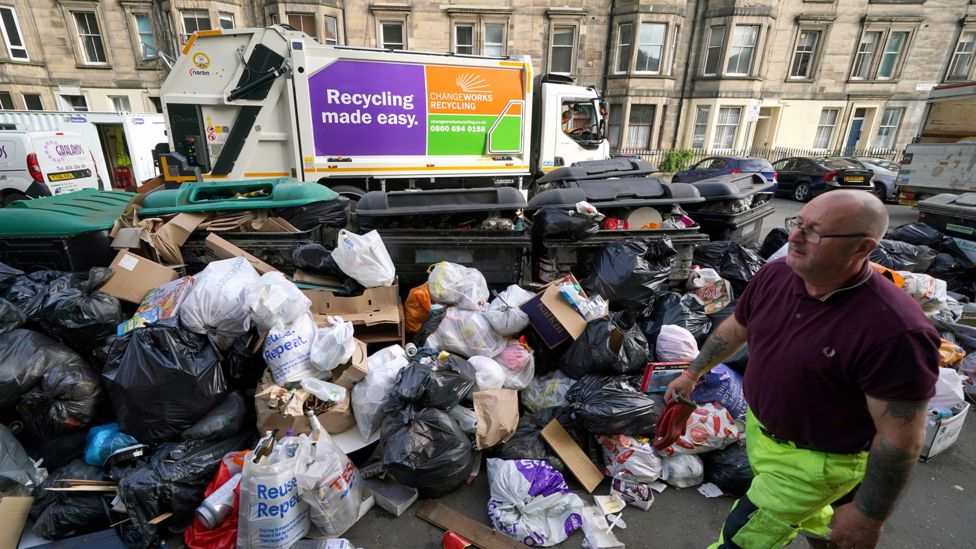
Unions launched industrial action on 18 August in the middle of the Edinburgh Festival, in a pay dispute with local government body Cosla.
The walkout in the capital ended at 04:59 as rubbish continues to pile up in other Scottish council areas.
On Monday Unite, the GMB and Unison confirmed further strikes would be held after rejecting an increased pay offer.
City of Edinburgh Council said additional resources would be deployed to support the clean up.
However, it said many residents would not have their full backlog of waste collected before the next round of action on 6 September.
People are being asked to store their waste “a little longer” while waste and recycling staff catch up.
The 140,000 households that have kerbside pickups in the city have landfill waste and dry recycling waste collected on alternate weeks.
The council said only one type of rubbish would be picked up per household.
Overflowing bins are seen on nearly every street, including along the busy Grassmarket
Edinburgh councillor Scott Arthur told BBC Scotland: “We expect residents to put the wheelie bins out on the streets as normal.
“That is a huge focus for us – just getting those kerbside collections back to normal as soon as possible.
“We won’t be collecting glass recycling in the short-term, so we can focus as much resource as possible onto getting the core service up and running, the residential collections and the city centre litter bins.”
‘I feel ashamed’
Public Health Scotland has warned of a human health risk from overflowing waste and advised councils to decontaminate areas where bins have overflowed.
Mr Arthur added: “I think it’s really important that we get things back to normal so we can be proud of our city and proud of our council staff.
“I feel ashamed at some of the sights we’ve seen in the city centre.
“I say that as someone who absolutely supports the staff because I think they deserve a fair pay rise.”
Unions had been seeking an agreement from Cosla similar to the one made to council workers in England – which included a £1,925 flat rate pay increase.
The pay dispute led to action by refuse staff at two-thirds of Scotland’s councils and is also set to close schools and nurseries.
Edinburgh began the first of a series of strikes around the country after the GMB, Unite and Unison rejected an initial pay offer equivalent to a 3.5% increase.
This escalated last week when refuse workers at a further 20 local authorities, including Glasgow, Aberdeen and Dundee, walked out despite a revised 5% offer.
A second wave of strikes is due to begin with hundreds of schools and nurseries also scheduled to close from 6 to 8 September.
On Monday, Unite and the GMB rejected a further offer from Cosla, while Unison said it would put it to its members.
Cosla’s offer of a £1,925 pay uplift matched the offer to council workers in England – but only part of this payment was consolidated into staff salaries. The rest would be given as one-off cost of living payments.
Unions said this means lower-paid staff would not benefit as much as those on higher wages.
Unite’s industrial officer Wendy Dunsmore said: “In real terms it leaves the lowest paid workers no better-off and a significant proportion of the offer does not enhance overtime, allowances or pensions.”
Mark Ferguson of Unison’s local government committee said strike action was a “last resort”.
GMB Scotland’s Keir Greenaway said they had written to Cosla urging them to return to talks “as soon as possible”.
The Scottish government has given an additional £140m to councils to help fund a pay increase for staff.
Deputy First Minister John Swinney also said a further £200m would be offered over two years to provide a cost of living payment to workers earning below £39,000.
Mr Swinney added: “No deal is perfect, and I wish we could go further, but this deal does offer significant increases for those on low pay.”
Cosla said it was disappointed that unions had turned down an offer that was at the “absolute extremes” of affordability.
Resources spokesperson Katie Hagmann said: “We have done everything we possibly can to get to this stage and this offer – which is still on the table – is as good as it gets.”






